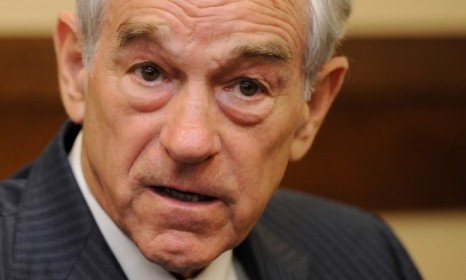Why the 2012 GOP candidates aren't hawks: 4 theories
Many Republican presidential candidates are backing away from a George Bush-like, hawkish foreign policy. Let the analysis begin

A free daily email with the biggest news stories of the day – and the best features from TheWeek.com
You are now subscribed
Your newsletter sign-up was successful
Conservative hawks are bemoaning the 2012 GOP presidential candidates' apparent aversion to using U.S. force abroad. "Will the GOP nominate a dove?" asks Jackson Diehl in The Washington Post, after Monday night's presidential debate, during which the candidates uniformly criticized the war in Libya and distanced themselves from America's military commitment in Afghanistan. Sen. Lindsey Graham (R-S.C) warned the GOP candidates that "the biggest disaster would be to let Barack Obama become Ronald Reagan and [the GOP field] become Jimmy Carter." What's happened to the Republican Party's "hawkish consensus on national security"? Here, four theories:
1. Dovish isolationism fits America's mood
Backing away from a George W. Bush-style foreign policy may upset neocons, but it "might make for smart politics," says Michael Cohen at Foreign Policy. Polls confirm that the war in Afghanistan is quite unpopular, and there's a "growing skepticism among voters about Washington's seemingly limitless conception of U.S. power and interests."
The Week
Escape your echo chamber. Get the facts behind the news, plus analysis from multiple perspectives.

Sign up for The Week's Free Newsletters
From our morning news briefing to a weekly Good News Newsletter, get the best of The Week delivered directly to your inbox.
From our morning news briefing to a weekly Good News Newsletter, get the best of The Week delivered directly to your inbox.
2. Ron Paul and the Tea Party are steering the GOP
The GOP might historically favor U.S. military might, "but the party's Tea Party wing has issued calls to put the Pentagon's bloated budget on the cutting block," says Foreign Policy's Cohen. And with several GOP candidates citing the massive costs of our many wars, it sure looks like "Republicans are now listening more to Ron Paul than they are to Dick Cheney."
3. Republicans are against anything Obama is for
"It's always easier to oppose intervention abroad when the other party's in power," says Jesse Walker in Reason. There's no difference between Obama trashing Bush on Iraq in 2007, and "Michele Bachmann criticizing Barack Obama's war in Libya." Well, not quite, says Steve M. in No More Mister Nice Blog. Republicans, unlike Democrats, are hawkish by default. But when Obama turned out to be "(inconveniently) not wearing sandals and putting daisies in gun barrels," the GOP decided that "if he's for [war], Republicans must be (in a nuanced way) against it."
A free daily email with the biggest news stories of the day – and the best features from TheWeek.com
4. All candidates talk this way
We remember Bush as a neocon interventionist, but, as a candidate in 2000, he campaigned on a modest, humble foreign policy that "eschewed nation-building," says Adam Serwer at The American Prospect. And candidate Obama "was all about avoiding unnecessary conflicts," even against brutal despots. It's possible candidates really mean what they say... until they take office. Then, "the foreign policy establishment" — "still mostly neoconservative" on the GOP side and mostly "liberal interventionists" for the Democrats — has their ear.